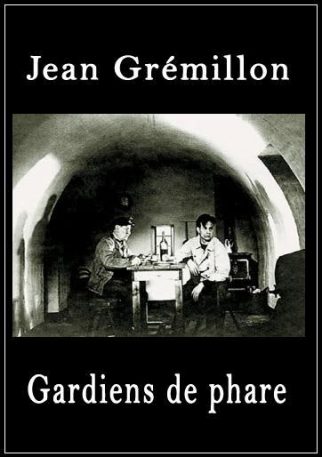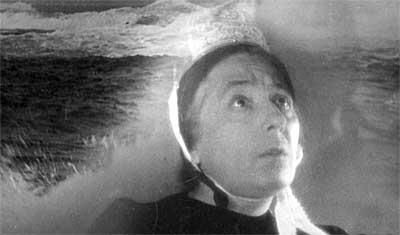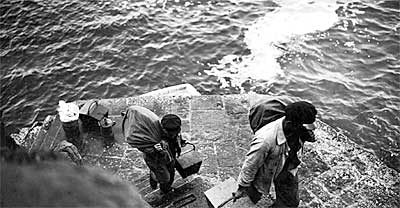 The legendary Grand Guignol Theatre provided the source material for this silent drama from 1929. You probably won’t find another case of material more directly at odds with its treatment than this film, a sensitive and poetic reverie adapted from a play whose primary goals were shock and titillation.
The legendary Grand Guignol Theatre provided the source material for this silent drama from 1929. You probably won’t find another case of material more directly at odds with its treatment than this film, a sensitive and poetic reverie adapted from a play whose primary goals were shock and titillation.
THE LIGHTHOUSE KEEPERS (GARDIENS DE PHARE) was an early feature by France’s Jean Grémillon, whose golden age commenced a decade later. This early effort evinces a number of elements that typified Grémillon’s better-received later works like GUELE D’AMOUR (1937) and LUMIERE D’ETE (1943), namely a rich, poetic atmosphere and a heavy directorial hand that borders on show-offy (restraint was never among Grémillon’s attributes).
The initial 1905 play, written by Paul Autier and Paul Cloquemin, was among the shorter Guignol offerings, a typical night of which included four separate plays spanning comedy, horror and drama. THE LIGHTHOUSE KEEPERS was among the latter, although it definitely had its share of horrific elements, namely disease, murder and insanity (all Grand Guignol staples).
 In padding Autier and Cloquemin’s one act drama (which spans a little over eight pages in its English translation) to feature length Grémillon adds a fair amount of extraneous detail—including lengthy shots of the principals walking around and ships sailing toward the lighthouse that provides the film’s setting—and also devotes a great deal of time to an encounter with a dog that was spoken of but not dramatized in the play. The dog in question is rabid, and bites Yvon, one of the two lighthouse keepers of the title.
In padding Autier and Cloquemin’s one act drama (which spans a little over eight pages in its English translation) to feature length Grémillon adds a fair amount of extraneous detail—including lengthy shots of the principals walking around and ships sailing toward the lighthouse that provides the film’s setting—and also devotes a great deal of time to an encounter with a dog that was spoken of but not dramatized in the play. The dog in question is rabid, and bites Yvon, one of the two lighthouse keepers of the title.
The other lighthouse keeper is Yvon’s father, with whom Yvon is holed up in the lighthouse for thirty days. On the first of those days the rabies-infected Yvon finds himself overcome with sickness and fatigue, with his concerned father powerless to do anything to help. As the days go on Yvon finds himself assailed by thirst but can’t drink and experiences unsettling hallucinations. Eventually the atmosphere turns toxic as Yvon is overcome with viciousness and paranoia. In the melee the lighthouse light is switched off, and Yvon’s father finally strangles his son—which occurs just as a ship is making its way toward the shore of the lightless lighthouse.
 The proceedings are marked by scant dialogue that combined with a severely minimalistic narrative leave the florid and expressive visuals to move things along by themselves. Those visuals aptly demonstrate Grémillon’s love for and skill in photographing natural landscapes, with crashing waves and roiling seas effectively intercut with the drama in the lighthouse, and also his flair for expressionist apprehension, evident in the shadowy interior scenes. The film is first and foremost a visual feast, although Grémillon isn’t above inserting a great deal of overwrought melodrama (as in a close-up of the dog that bit Yvon peeking sadly through the bars of a cage as his captors discuss putting it down).
The proceedings are marked by scant dialogue that combined with a severely minimalistic narrative leave the florid and expressive visuals to move things along by themselves. Those visuals aptly demonstrate Grémillon’s love for and skill in photographing natural landscapes, with crashing waves and roiling seas effectively intercut with the drama in the lighthouse, and also his flair for expressionist apprehension, evident in the shadowy interior scenes. The film is first and foremost a visual feast, although Grémillon isn’t above inserting a great deal of overwrought melodrama (as in a close-up of the dog that bit Yvon peeking sadly through the bars of a cage as his captors discuss putting it down).
As of late 2019 the only source for THE LIGHTHOUSE KEEPERS is a screener copy of extremely poor quality. It’s paired, at least, with a rich and highly percussive music score by Coracao Quiltera (recorded live at the Brazilian Cinematheque in August of 2011), but a restoration of this film is urgently needed.
Vital Statistics
THE LIGHTHOUSE KEEPERS (GARDIEN DE PHARE)
Films du Grand Guignol
Director: Jean Grémillon
Screenplay: Jacques Feyder
(Based on the play by Paul Autier, Paul Cloquemin)
Cinematography: Georges Périnal
Editing: Jean Grémillon
Cast: Paul Fromet, Geymond Vital, Genica Athanasiou, Gabrielle Fontan, Maria Fromet
